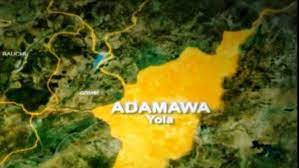The Adamawa State High Court sitting in Yola on Monday heard a case filed by a faction of the African Democratic Congress (ADC) challenging their removal as state executives of the party.
The group, led by the embattled former state chairman, Shehu Yohanna, is asking the court to reinstate them to office after they were replaced by a steering committee appointed by the ADC national leadership.
The case, which is being handled by Justice Hafsat Abdulrahman of High Court IX, has drawn attention to the lingering leadership crisis within the ADC, one of Nigeria’s smaller but active political parties.
The internal conflict in the ADC’s Adamawa chapter started earlier this year when the National Working Committee (NWC) of the party dissolved the state executive committee over alleged misconduct and poor performance.
The NWC subsequently announced the formation of a caretaker or steering committee to manage the party’s affairs pending a new congress.
However, Yohanna and his fellow executives described the move as illegal and unconstitutional, arguing that they were elected for a four-year term that had not yet expired.
According to the faction, their removal was done without due process, and they were neither issued queries nor given any opportunity to defend themselves. The aggrieved officials, therefore, approached the court seeking judicial intervention to nullify their removal and compel the national leadership to recognize them as the authentic state executives.
In the suit, the plaintiffs — Shehu Yohanna and one other — listed as defendants Umar Sulaiman, Sadiq Dasin, Saidu Komsiri, Babachir Lawal, the ADC National Working Committee (NWC), and Senator David Mark, who serves as the party’s National Chairman.
During Monday’s proceedings, the counsel representing the plaintiffs, Yakubu Philemon (SAN), informed the court that the case was coming up for further mention and to allow the defendants to show cause why an order of interim injunction should not be granted against them.
Philemon said his clients were asking the court to protect their positions pending the determination of the substantive suit, adding that the defendants’ actions violated the party’s constitution and democratic principles.
On their part, counsel to the defendants, Ibrahim Effiong, said his clients had filed a preliminary objection challenging the jurisdiction of the court to hear the case.
He argued that the dispute was a purely internal party matter, which the court should not interfere in.
“It’s a purely internal party dispute. We believe the court has no business interfering in the internal affairs of the ADC,” Effiong told journalists after the sitting.
Justice Abdulrahman, after listening to both sides, directed the defendants to file their statement of defence so that both the preliminary objection and the main suit could be heard together.
The judge then adjourned the case to November 20, 2025, for the next hearing.
Speaking to reporters outside the courtroom, the plaintiffs’ lawyer, Philemon (SAN), explained that his clients were forced to seek legal redress after several failed attempts to resolve the issue internally.
He said the plaintiffs were duly elected officials of the ADC in Adamawa State and that their tenure was cut short unlawfully.
“The matter came up for further mention and for the defendants to show cause why our motion ex parte and the order of interim injunction should not be granted,” he said.
“We are confident that the court will do justice to the matter and restore the rights of our clients who were removed before the expiration of their tenure.”
Philemon added that the plaintiffs were not seeking to create division in the party but to ensure respect for internal democracy and adherence to the ADC’s constitution.
The African Democratic Congress, founded in 2005, is one of Nigeria’s recognized political parties with a presence in all 36 states. It has often positioned itself as a reformist party, emphasizing youth inclusion, transparency, and alternative governance ideas.
However, like many smaller political parties in Nigeria, the ADC has faced frequent internal leadership crises, both at the national and state levels.
In the lead-up to the 2023 general elections, the ADC suffered multiple internal rifts over party primaries and alliances, which weakened its performance at the polls.
In several states, including Ogun, Oyo, and Kogi, the party has witnessed similar legal battles between rival factions claiming leadership legitimacy.
If the court upholds the preliminary objection of the defendants, it would mean that internal party matters are beyond judicial scrutiny, reinforcing the independence of political organizations in managing their affairs.
However, if the court rules in favour of the plaintiffs, it could strengthen the argument that party executives cannot be removed arbitrarily without following laid-down procedures.
For now, both factions in the Adamawa ADC are holding on to their positions, awaiting the court’s next ruling.

